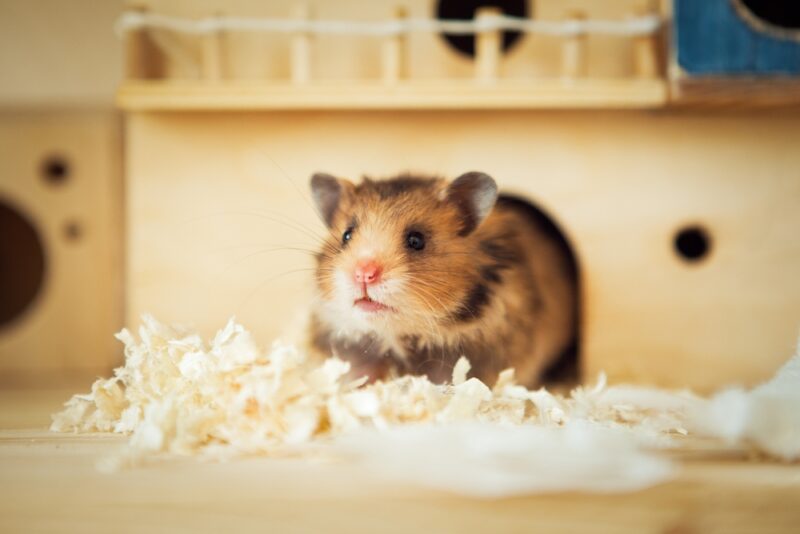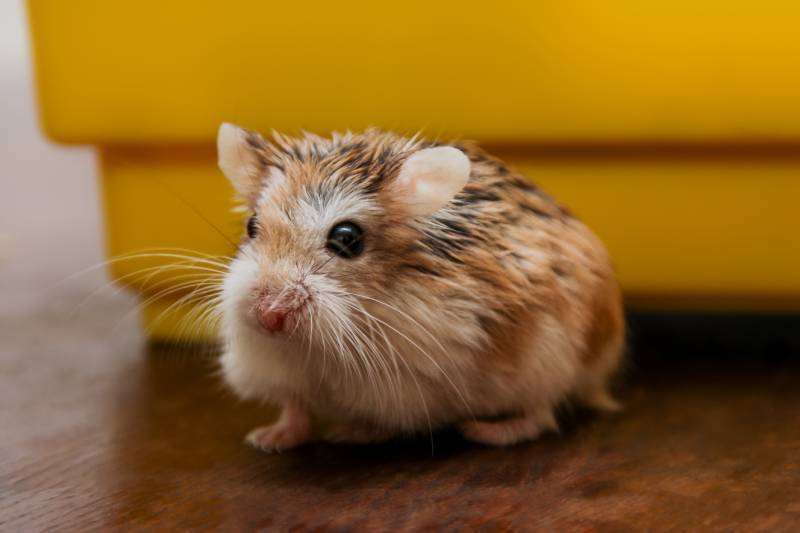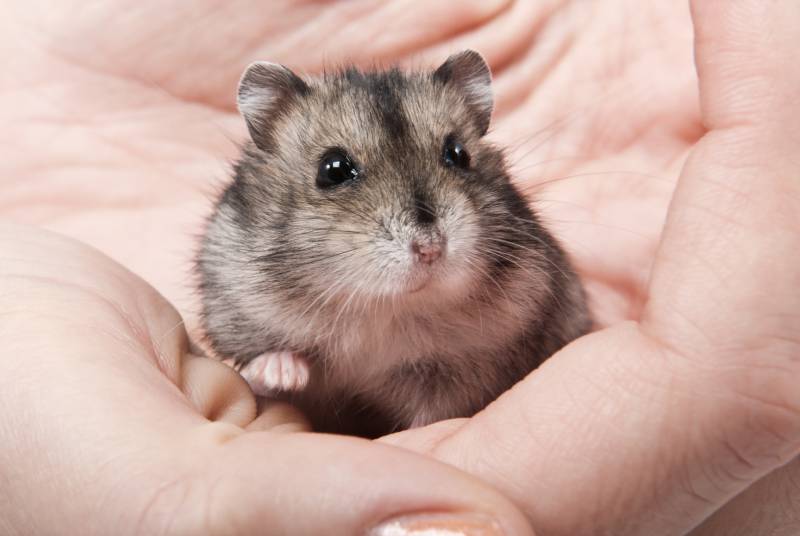VET APPROVED

The information is current and up-to-date in accordance with the latest veterinarian research.
Learn more »Click to Skip Ahead
Have you ever wondered if hamsters like music? After all, they seem to be keen listeners, often cocking their heads in curiosity at new sounds. Research suggests that hamsters may respond favorably to music—in the right context! However, music isn’t without its risks for hamsters and therefore, you might benefit from exercising some caution when it comes to breaking out the tunes for your beloved pet (especially in terms of its volume). Read on as we explain this more!

Do Hamsters Like Music?
The research involving rodents and their affinity to music has found that music may have some favorable effects on rodents.1
In studies specifically involving hamsters, the primary effects of music and noise on them was hyperactivity (as opposed to relaxation).2 Hamsters can also experience tinnitus (a buzzing or roaring sound) after exposure to loud music for a long period of time.3 That being said, music of various genres of appropriate volumes has definitely demonstrated positive effects on hamsters.4
Anecdotally, hamsters do respond to music when their owners play sounds for them. This is expected, as hamsters would respond to an auditory stimulus in their environment. In addition, it would also correlate with the positive findings of music on hamsters in research.

What Kind of Music Do Hamsters Like?
Most studies involving rodents tend to use well-known classical music (such as the compositions of Mozart), and other popular research genres. These include other classical music, jazz, or soft rock.
Some people have compiled Spotify playlists with music designed for hamsters and other small rodents to enjoy. Additionally, it’s important to keep the volume level low since loud noises may startle your small pet.
How Will I Know If My Hamster Likes Music?
If your hamster enjoys music, they’ll likely start by appearing more intrigued. Eventually, anecdotal evidence suggests that they would likely end upbecoming calmer and more relaxed. They may even start moving around as if they’re dancing! Hamsters are also known to respond positively when music is playing by grooming themselves, exploring their environment more freely, or snuggling up in a comfortable spot. When it comes to music and hamsters, the proof is in the pudding, so pay close attention to how your pet reacts when you put on some tunes!

Can Hamsters Hear More Sounds Than Humans?
Hamsters have a well-developed sense of hearing,5 enabling them to pick up frequencies that humans can’t even detect. This means hamsters can hear audio that humans cannot. As explained earlier, hamsters do not respond favorably to loud noises. As such, the volume of music you play for your hamster should be reasonable, or it might stress them out.

What Is the Safe Sound Level for Hamster Ears?
The safe sound level for hamster ears is 85 dB sound pressure level or lower. Any sound above this level could cause hearing damage to your pet hamster. It is best to keep the volume of music or sound systems low and avoid exposing them to loud noises, such as barking dogs, squealing, etc. Hamsters rely largely on their hearing to navigate their habitat and avoid predators, so it is important to ensure they are not exposed to any loud noises that could harm them.
How Can I Tell If My Hamster Is Uncomfortable With Music?
There are several ways to tell if your hamster is uncomfortable. One of the most obvious signs is if they freeze or hide in their shelter when exposed to loud noises. Other signs that indicate your hamster may be overwhelmed by sound include flattening of the ears, trembling, and biting if approached while the music is playing.
If you notice any of these signs, it’s important to remove any source of loud noise as quickly as possible and make sure your hamster has a safe space they can retreat to if they feel scared or overwhelmed. It is also important to make sure your hamster has plenty of toys and activities to keep them occupied and happily distracted from any uncomfortable sounds.
Can Hamsters Die From Loud Noises?
No, hamsters cannot die from loud noises alone. However, they can die from stress. They are incredibly sensitive to loud sounds and can become scared if they hear a sudden noise. Prolonged exposure to sounds above a tolerable decibel level could cause health problems like wet tail, which is a gastrointestinal illness. Over time, these stress-related problems can become fatal illnesses.


The 10 Tips for Keeping Your Hamster Safe When You Play Music
- Keep the volume of any music you play for your hamster low and at a safe decibel level.
- Try playing different genres of music to see which one your pet enjoys the most.
- Be mindful of sudden loud noises that could startle or frighten your pet.
- Let your hamster retreat to their safe space if they become overwhelmed.
- Make sure your hamster has plenty of toys and activities to keep them occupied and happy.
- Avoid playing music that is too repetitive or noisy, as this could cause boredom or stress.
- Place the speaker on a low surface instead of having it near your hamster’s head.
- Consider buying a pet-friendly speaker made specifically for animals.
- Speak to your veterinarian if you have any concerns about the volume of the music or its effects on your pet’s health.
- Above all, enjoy the time with your furry friend, and make sure they have plenty of fun!
Is There a Pet-Friendly Speaker I Can Buy for My Hamster?
Yes, you can purchase pet-friendly speakers made specifically for animals. These are designed to produce sounds at a comfortable level and won’t frighten your pet. It’s also important to place the speaker on a low surface instead of near your hamster’s head.

Conclusion
Hamsters can appreciate and even like music, but it should be played at a low volume. Too much noise can cause hearing damage and significant levels of stress. It is essential to keep the volume of music or sound systems low when your hamster is in the same space to avoid exposing them to loud noises that could trigger stress and anxiety. By monitoring your pet’s sound environment, you will ensure their comfort and safety for a long and happy life.
- https://www.ncbi.nlm.nih.gov/pmc/articles/PMC6302112/
- https://www.dailymail.co.uk/news/article-11861185/Hip-hop-hamsters-classical-cats-pets-different-musical-tastes.html
- https://famillypet.com/are-hamsters-sensitive-to-noise/
- https://smallpetsgenie.com/are-hamsters-sensitive-to-sound/
- https://pocketpetcentral.com/can-hamsters-die-from-loud-noises/
- https://pmc.ncbi.nlm.nih.gov/articles/PMC6302112/#s4
- https://www.sciencedirect.com/science/article/abs/pii/S0006899318300027
- https://www.coursehero.com/file/229929477/IMRAD-FINAL-1docx/
Featured Image Credit: Hintau Aliaksei, Shutterstock










